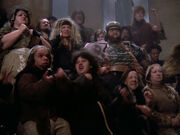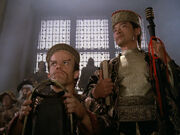(trim some overdetailed sentences unrelated to the era. They are reproduced in more relevant articles.) |
No edit summary |
||
| Line 5: | Line 5: | ||
In the mid-2050s, [[Colonel]] [[Phillip Green]] ordered the euthanasia of hundreds of thousands of radiation-sickness stricken Humans so they wouldn't pass on mutations to future generations. Green outlined his rationale by speaking to a crowd about how they must "reject the impure and cast it out." ({{ENT|Demons}}) |
In the mid-2050s, [[Colonel]] [[Phillip Green]] ordered the euthanasia of hundreds of thousands of radiation-sickness stricken Humans so they wouldn't pass on mutations to future generations. Green outlined his rationale by speaking to a crowd about how they must "reject the impure and cast it out." ({{ENT|Demons}}) |
||
| − | During the [[2060s]] [[Zefram Cochrane]] lived in [[Bozeman]], [[Montana]] where he and his team of [[engineer]]s began developing the [[warp drive]] and finally built Earth's first warp ship, the ''[[Phoenix]]''. The ship drew the attention of the [[Vulcan]] ship ''[[T'Plana-Hath (starship)|T'Plana-Hath]]'' passing near Earth. The Vulcan ship landed in Montana, thereby making [[first contact]] with humans, and opening a new era for the whole of mankind. ({{film|8}}) This event is generally referred to as the defining moment in [[Human history]], eventually paving the way for a unified [[United Earth|world government]] |
+ | During the [[2060s]] [[Zefram Cochrane]] lived in [[Bozeman]], [[Montana]] where he and his team of [[engineer]]s began developing the [[warp drive]] and finally built Earth's first warp ship, the ''[[Phoenix]]''. The ship drew the attention of the [[Vulcan]] ship ''[[T'Plana-Hath (starship)|T'Plana-Hath]]'' passing near Earth. The Vulcan ship landed in Montana, thereby making [[first contact]] with humans, and opening a new era for the whole of mankind. ({{film|8}}) This event is generally referred to as the defining moment in [[Human history]], eventually paving the way for a unified [[United Earth|world government]] ({{VOY|Homestead}}) |
| − | However the 'horror' would still prevail for some years to come. By [[2079]], the [[New United Nations]] had ceased to exist, [[lawyer]]s had been abolished (by execution) and [[martial law]] was still in effect in some areas of the world. ({{TNG|Encounter at Farpoint}}) |
+ | However the 'horror' would still prevail for some years to come. By [[2079]], the [[New United Nations]] had ceased to exist, [[lawyer]]s had been abolished (by execution) and [[martial law]] was still in effect in some areas of the world. ({{TNG|Encounter at Farpoint}}) |
| + | Eventually, motivated by the new interstellar reality beginning with the first contact, Earth managed to eliminate war, crime, poverty and the causes thereof have been eliminated and by [[2151]] Earth's last holdouts agreed to join [[United Earth]] paving the way later for the [[United Federation of Planets]]. |
||
| ⚫ | |||
| ⚫ | |||
==Background== |
==Background== |
||
''[[Star Trek: Enterprise]]''{{'}}s explanation of life on Earth following [[First Contact]] with the [[Vulcan]]s would seem to contradict the notion of post-atomic horror. However, as Q's courtroom seemed to be slightly influenced by Eastern culture (the bailiff was Mandarin), we may assume that the horror was not wide-spread, or was confined to regional areas such as the [[Eastern Coalition]]. {{film|8}} portrayed post-World War III life on Earth in [[North America]] as something far less brutal (perhaps this is why the Vulcans chose to stay and help Humanity rebuild). |
''[[Star Trek: Enterprise]]''{{'}}s explanation of life on Earth following [[First Contact]] with the [[Vulcan]]s would seem to contradict the notion of post-atomic horror. However, as Q's courtroom seemed to be slightly influenced by Eastern culture (the bailiff was Mandarin), we may assume that the horror was not wide-spread, or was confined to regional areas such as the [[Eastern Coalition]]. {{film|8}} portrayed post-World War III life on Earth in [[North America]] as something far less brutal (perhaps this is why the Vulcans chose to stay and help Humanity rebuild). |
||
Revision as of 15:00, 25 November 2011

A group of post-atomic war era Human

Two disposers at a trial during the post-atomic horror.
The term post-atomic horror was used by future Earth historians to refer to the global turmoil which resulted after the end of the Third World War in 2053. Because the war was a nuclear exchange, large populations of Humans were bombed out of existence, and the survivors were placed in jeopardy by radioactivity, supply shortages, and the collapse of most of the major governments.
In the mid-2050s, Colonel Phillip Green ordered the euthanasia of hundreds of thousands of radiation-sickness stricken Humans so they wouldn't pass on mutations to future generations. Green outlined his rationale by speaking to a crowd about how they must "reject the impure and cast it out." (ENT: "Demons")
During the 2060s Zefram Cochrane lived in Bozeman, Montana where he and his team of engineers began developing the warp drive and finally built Earth's first warp ship, the Phoenix. The ship drew the attention of the Vulcan ship T'Plana-Hath passing near Earth. The Vulcan ship landed in Montana, thereby making first contact with humans, and opening a new era for the whole of mankind. (Star Trek: First Contact) This event is generally referred to as the defining moment in Human history, eventually paving the way for a unified world government (VOY: "Homestead")
However the 'horror' would still prevail for some years to come. By 2079, the New United Nations had ceased to exist, lawyers had been abolished (by execution) and martial law was still in effect in some areas of the world. (TNG: "Encounter at Farpoint")
Eventually, motivated by the new interstellar reality beginning with the first contact, Earth managed to eliminate war, crime, poverty and the causes thereof have been eliminated and by 2151 Earth's last holdouts agreed to join United Earth paving the way later for the United Federation of Planets.
In 2364 Q showed the crew of the USS Enterprise-D a barbaric court of the year 2079, complete with drugged soldiers, a crowd of rag-tag mutants and harsh judges handing down summary executions. (TNG: "Encounter at Farpoint")
Background
Star Trek: Enterprise's explanation of life on Earth following First Contact with the Vulcans would seem to contradict the notion of post-atomic horror. However, as Q's courtroom seemed to be slightly influenced by Eastern culture (the bailiff was Mandarin), we may assume that the horror was not wide-spread, or was confined to regional areas such as the Eastern Coalition. Star Trek: First Contact portrayed post-World War III life on Earth in North America as something far less brutal (perhaps this is why the Vulcans chose to stay and help Humanity rebuild).
Further evidence of a limited extent of the horror may include the well-dressed Janeway family in a ca. 2050 photograph, although the location of the photo is unknown.
